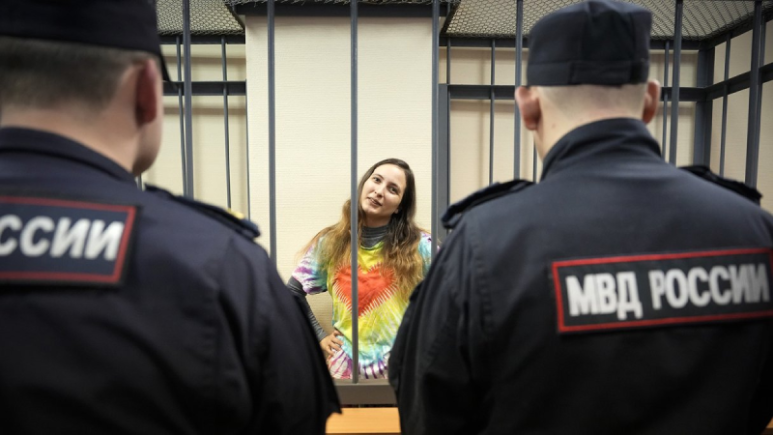The Threat of Non-Violence: What Signal Does Sasha Skochilenko’s Sentence Send to Society?
By Maxim Krupskiy, Visiting Scholar at Fletcher Russia and Eurasia Program
It is difficult to perceive harsh sentences under the article of the Criminal Code on spreading “fakes” as separate from the whole series of pardons for participants of the “special operation” who committed serious crimes, says lawyer Maxim Krupsky. It turns out that violence is normalized in the eyes of society, but the pacifist agenda, on the contrary, turns into a “threat to public safety.”
On November 16, 2023, the Vasileostrovsky district court of St. Petersburg, represented by Judge Oksana Demyasheva, sentenced artist Sasha Skochilenko to seven years in prison in the case of spreading “fakes” about the Russian army on the grounds of political, ideological hatred or enmity (paragraph e part 2 of article 207.3 of the Criminal Code of the Russian Federation). Sasha received this sentence because, in March 2022, she replaced several price tags in the store “Perekrestok” with papers containing information about the number of victims of the “special operation” in Ukraine and calls to stop it. The reason for the criminal case against Sasha was the denunciation of a 76-year-old pensioner from St. Petersburg, Galina Baranova.
As it is known, Article 207.3 of the Criminal Code of the Russian Federation appeared in March 2022, almost immediately after the start of the “special operation.” To date, dozens of criminal cases have already been initiated under this article throughout Russia, and many people, like Sasha Skochilenko, have been sentenced to real imprisonment.
Worse than murder
In July 2022, the first person sentenced to seven years in prison under this article was municipal deputy Alexei Gorinov. In March 2023, student Dmitry Ivanov and opposition politician Ilya Yashin (labeled by the Ministry of Justice as a foreign agent) were sentenced to eight and a half years in prison for disseminating “fakes.” A month earlier, a journalist from Barnaul and the mother of two minor children, Maria Ponomarenko, was sentenced by the court to six years. Also in 2023, Olga Smirnova from St. Petersburg was sentenced to six years in prison, and Oleg Belousov from St. Petersburg was sent to a penal colony for five and a half years. These are only the most famous stories. The basis for all these criminal cases was public statements or posts on social media.
The criminalization of the dissemination of “fake” information about the actions of Russian troops from the point of view of the public danger of this activity raises big questions, especially against the background of examples of what precise actions Russian judges recognize as criminal. It would require a very strange attitude to the principles of law to consider as normal the juxtaposition in one chapter of the Criminal Code “Crimes against Public Security” of such elements as “Terrorist Act” (Article 205), “Hostage Taking” (Article 206), “Organization of an Illegal Armed Formation” (Article 208), and public dissemination of “fakes” about the Russian army (Article 207.3), which in the case of Sasha Skochilenko was expressed in the dissemination of five pieces of paper in a grocery supermarket.
Even more questionable is the harshness of the punishment imposed by Russian courts for non-violent criminal acts: up to eight and a half years of real imprisonment. It is worth recalling that the lower penalty for murder (part 1 of article 105 of the Criminal Code of the Russian Federation) is six years’ imprisonment. Thus, in the eyes of the Russian prosecution and court, the non-violent actions of Sasha Skochilenko and other defendants under Article 207.3 of the Criminal Code of the Russian Federation represent a greater social danger than the deliberate deprivation of human life.
The normalization of violence
These cruel sentences take on a special halo against the background of reports of the Russian president pardoning participants in “special operations” from among those who had previously committed particularly serious violent crimes. Thus, the pardon and return to freedom in 2023 after a trip to Ukraine of Vladislav Kanyus, who in July 2022 was sentenced to 17 years in a strict regime colony for the murder of his ex-girlfriend, 23-year-old Vera Pekhteleva, caused a great public resonance. He spent less than six months in prison. Moreover, as it became known, Kanyus, as a result of the pardon, not only got freedom but was also released from the obligation to pay moral compensation to the relatives of the deceased in the amount of 4 million rubles. And this is not an isolated case. Back during the activities of PMC Wagner, the practice of pardoning former prisoners became widespread.
Thanks to Russian justice, we have long perceived criminal law, originally conceived as a tool to protect society from the most dangerous encroachments, as a tool to discipline society in the interests of the authorities. However, the practice of application of Article 207.3 of the Criminal Code of the Russian Federation, along with the pardon by the head of state of those convicted of especially serious violent crimes, by its social consequences goes far beyond the further establishment of legal nihilism in Russia. The most pernicious consequence here is the normalization in the public consciousness of violence as such, the demonstration of its social approval at the state level. On the contrary, the pacifist agenda and public declaration by citizens of their commitment to non-violent principles is today a “threat to public safety” and a basis for prosecution.
That, in turn, leads us to think once again about what Sasha Skochilenko herself said in her last statement: “The state prosecutor has repeatedly mentioned that my act is extremely dangerous for society and the state. How little faith in our state and society does our prosecutor have if he thinks that our statehood and public safety can be destroyed by five small pieces of paper?”
(This post is translated and republished from Forbes Russia.)

